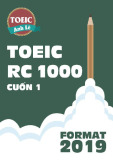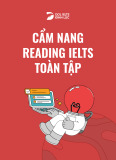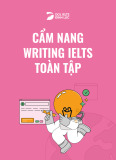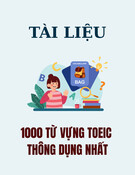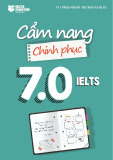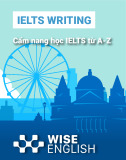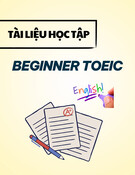
ĐỀ THI
CHỨNG CHỈ C TIẾNG ANH
CHỨNG CHỈ C TIẾNG ANH

Paper 1
READING COMPREHENSION
SECTION A
Choose the word or phrase that best completes each sentence.
1) It is usually better not to …. things, in case they are not returned.
A. lose B. offer C. borrow D. lend
2) You can learn as much theory as you like, but you only master a skill by …. it
a lot.
A. practising B. training C. exercising D. doing
3) The author had qualified as a doctor but later gave up the …. of medicine for
full-time writing.
A. treatment B. practice C. procedure D. prescription
4) It’s twenty years now since the Socialists came to ….. in that country.
A. control B. force C. power D. command
5) Learners of English as a foreign language often fail to ….. between
unfamiliar sounds in that language.
A. separate B. differ C. distinguish D. solve
6) I have lived near the railway for so long now that I’ve grown ….. to the noise
of the trains.
A. accustomed B. familiar C. unconscious D. aware
7) If only I …… play the guitar as well as you!
A. would B. should C. could D. might
8) John swims very well and …. does his brother.
A. also B. even C. so D. too
9) I have absolutely no doubt ….. the innocence of the accused.
A. about B. over C. on D. with
10) After the race …. the celebration began.
A. had been won B. had won C. will be won D. get out of
11) Until you learn to relax more, you …… your ability to speak English.
A. haven’t improved B. aren’t improving

C. don’t improve D. won’t improve
12) The old people died, but the young ones lived …..
A. in B. off C. on D. about
13) The warranty is a contract that spells …… your rights.
A. on B. off C. on D. about
14) Instead of …… about the good news, Tom seemed to be indifferent.
A. exciting B. being excited C. excited D. being exciting
15) We considered …… after work.
A. to go shopping B. going to shop C. going shopping D. to go to shop
16) He has written a book ….. I have completely forgotten.
A. the name of which B. which name
C. whose name D. A and C are correct.
17) I wish you …… to me before you went and bought that car.
A. spoke B. had spoken C. have spoken D. would have spoken
18) I ….. what the weather is going to be like tomorrow.
A. think B. suppose C. wonder D. demand
19) She …… possibly be Tom’s mother! She doesn’t look old enough.
A. mustn’t B. shouldn’t C. can’t D. needn’t
20) We think that we will elect Somsak …..
A. for our chairman B. being our chairman
C. be our chairman D. our chairman
SECTION B
Read the following passage carefully, then choose the best answer to each
question.
Let children learn to judge their own work. A child learning to talk does not
learn by being corrected all the time: if corrected too much, he will stop talking.
He notices a thousand times a day the difference between the language he uses
and the language those around him use. Bit by bit, he makes the necessary
changes to make his language like other people’s. In the same way, children
learning to do all the other things they learn to do without being taught – to
walk, run, climb, whistle, ride a bicycle – compare their own performances with

those of more skilled people, and slowly make the needed changes. But in
school we never give a child a chance to find out his mistakes for himself; let
alone correct them. We do it all for him. We act as if we thought that he would
never notice a mistake unless it was pointed out to him, or correct it unless he
was made to. Soon he becomes dependent on the teacher. Let him do it himself.
Let him work out, with the help of other children if he wants it, what this word
says, what the answer is to that problem, whether this is a good way of saying or
doing this or not.
If it is a matter of right answers, as it may be in mathematics or science, give
him the answer book. Let him correct his own papers. Why should we teacher
waste time on such routine work? Our job should be to help the child when he
tells us that he can’t find the way to get the right answer. Let’s end all this
nonsence of grades, exams, marks. Let us throw them all out, and let the
children learn what all educated persons must some day learn, how to measure
their own understanding, how to know what they know or do not know.
Let them get on with this job in the way that seems most sensible to them, with
our help as school teachers if they ask for it. The idea that there is a body of
knowledge to be learnt at school and used for the rest of one’s life is nonsense in
a world as complicated and rapidly changing as ours. Anxious parents and
teachers say, “But suppose they fail to learn something essential, something they
will need to get on in the world?” Don’t worry. If it is essential, they will go out
into the world and learn it.
21) What does the author think is the best way for children to learn things?
A. by copying what other people do.
B. by making mistakes and having them corrected.
C. by listening to explanations from skilled people.
D. by asking a great many questions.
22) What does the author think teachers do which they should not do?
A. They give children correct answers.
B. They point out children’s mistakes to them.
C. They allow children to mark their own work.
D. They encourage children to copy from one another.
23) The passage suggests that learning to speak and learning to ride a bicycle are
…..
A. not really important skills.

B. more important than other skills.
C. basically different from learning adult skills.
D. basically the same as learning other skills.
24) Exams, grades and marks should be abolished because children’s progress
should only be estimated by ……
A. educated persons
B. the children themselves
C. teachers
D. parents
25) The author fears that children will grow up into adults who are …..
A. too independent of others
B. too critical of themselves
C. unable to think for themselves
D. unable to use basic skills
Paper 2
WRITING
SECTION A
USE OF ENGLISH
A/ Fill each of the numbered blanks in the following passage. Use only ONE
word in each space.
I always (26) …. down comfortably in the barber’s shop and listen (27) …. to
my barber. He explains the present political situation, women’s fashions, or (28)
…… me jokes which I have heard at (29) ……. five times already. In twenty
minutes I get a remarkable amount (30) …… information, as well as a hair-cut.
But last week our conversation was very short indeed. We (31) …… loud cries
of “Fire!” coming (32) …… upstairs. Customers and barbers (33) ……. out of
the shop immediately. We were certainly a funny sight (34) …… passers-by! I
had a white sheet (35) ……. my neck and my hair was half cut. My barber was
close behind me with a comb and a pair of (36) …… in his hands. The man who
had sat next to me was not so (37) …… There was soap (38) …… one side of
his (39) …… and his barber ran after him holding a shaving-brush in one hand
and a razor in the (40) ….. !
B/ GUIDED SENTENCE BUILDING



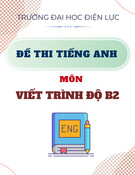

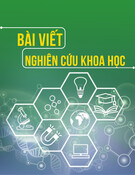
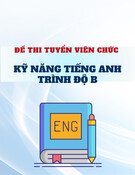

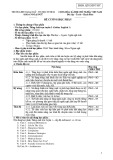
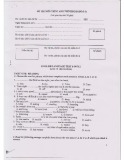
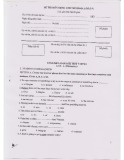
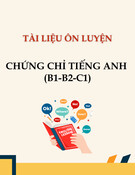
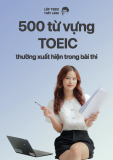
![Tài liệu luyện thi TOEIC cấp tốc trong 10 ngày [chuẩn nhất]](https://cdn.tailieu.vn/images/document/thumbnail/2025/20251029/kimphuong1001/135x160/99661761725822.jpg)
![Tài liệu Phá đảo TOEIC 900+ từ mất gốc trong 30 ngày [Mới nhất]](https://cdn.tailieu.vn/images/document/thumbnail/2025/20251029/kimphuong1001/135x160/2101761720956.jpg)
